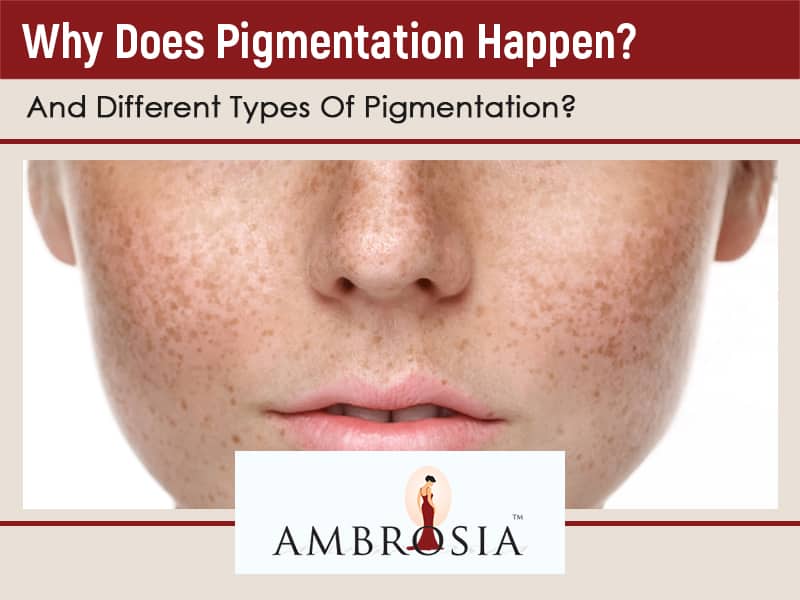Pigmentation: Your skin is among the first features people notice about you, and they really notice it. A tan here, a mole there and some spots here or even some allergy there. All of this is noticed by people in that few seconds they glance at you. So your skin is important. Internally and externally.
So what if your skin, you realise, has suddenly started to change, it can get darker or lighter(loss of skin colour). It can occur in patches in a particular area, can cover larger areas or more so, cover the entire body. There is no pain, however it is alarming. This condition of the sudden darkening of skin is called Skin Pigmentation.
There are mainly two types of skin pigmentation. When your skin turns darker, it is called Hyper-pigmentation and when your skin starts to lose its color it is called as Hypo-pigmentation.

What are the areas affected by skin pigmentation?
The areas affected due to skin pigmentation can be based on the type of pigmentation you have. Acquired pigmentation can occur in any part of the body but most commonly it is seen on the areas exposed to the sun like the arms, feet and face. Pigmentation can occur as small black spots or dark patches covering a particular area or over entire body.

What causes skin hyper-pigmentation?
One of the most common causes of skin hyperpigmentation is the excess production of melanin, which gives the skin its colour. Melanin is produced by skin cells called melanocytes present in the body. Various different conditions or factors can affect and alter the production of melanin in the body.
Often it so happens that certain medications can also cause skin hyperpigmentation. While this can happen, even a few chemotherapy drugs can cause hyperpigmentation as a side effect.
For women, pregnancy can be the cause of skin hyperpigmentation as there is an increase in the production of hormones in the body, including melanin.

Some endocrine diseases, such as Addison’s disease which affects your adrenal glands, disrupt the hormone levels and can result in increase of melanin production. As mentioned earlier excessive sun exposure can cause an increase in melanin production in the body. There are few types of pigmentation which are hereditary as well.
What are common types of skin hyperpigmentation seen on the face?
Your face is one of the most exposed areas of the body to the sun. In many ways, when it comes to skin hyperpigmentation, the face is affected the most, apart from your arms.
However, there are quite a few types of skin pigmentation which can be hereditary or acquired. Some of them are:
- Freckles: Freckles are flat small tan or light-brown spots on sun-exposed skin.
- Photo-aging
- Melasma
- Post-Inflammatory Pigmentation
- Dark circles (periorbital melanosis)
- Pigmentary demarcation lines
- Others causes of pigmentation – nutritional, chronic illness, drugs, malignancy, nevi, lichen planus pigmentosus, excessive use of cosmetics.

What are the treatment options for Skin Hyperpigmentation?
Treatments for skin hyperpigmentation are many. It ranges from medicines and creams or ointments and can be also be treated with chemical peels, dermaabrasion and lasers (Q-switch laser, fractional co2 laser and IPL) which is the most reliable form of treatment for this condition. The treatment options depend on the type of pigmentation.
Different types of laser are used depending on the type of pigmentation. If pigmentation is in superficial lesions, the Pigmentation Removal treatment is effective in removing the particular pigmentation in hardly three to four sessions. This treatment also depends on the area which is being treated, the type of pigmentation and even the level of recovery time. Laser treatment is one of the most advanced treatments for removing any kind of unwanted pigmentation on the skin such as age spots, tan and freckles.

Skin Pigmentation Removal is quick, gentle and a non-invasive treatment. The designed laser is absorbed only by the cells containing the excessive amounts of pigment. It does not even remotely affect the surrounding tissues or remove any normal skin colour. The pulses of light produced by the laser feels similar to the flicking of a rubber elastic band but is usually comfortable for most people. Immediately after the treatment, for a few lasers there is no down time you can immediately return to work but for some lasers (fractional co2) there is a certain level of darkening and for 5-7 days the area will look like a dark scab like texture but will eventually shed away.
Why do most over the counter creams fail to deliver results?
Skin pigmentation can be epidermal (superficial layers of skin ) or dermal (deep layers of skin). Few over the counter creams are effective in treatment of superficial pigmentation. But for mixed or deeper layers of skin pigmentation, they do not work because of limitation in the concentration and composition of the ingredients used.
Does skin prone to pigmentation need special care?
Yes, if you are often affected by skin hyper-pigmentation, you will need to take special care of your skin every day. You often go to work on bikes or any other kind of transport and when you walk, your skin is exposed to the sun for long periods of time which in turn can have an adverse effect on your skin.

When it comes to special care, there are few steps you need to follow to protect your skin:
- People with sensitive skin have to be more careful and take steps to take care of your skin.
- The first step which perhaps is the most important one is to protect yourself from the Sun. Excessive exposure to the rays of the Sun can result in skin hyper-pigmentation. Use an umbrella or a broad brim hat, or a scarf if you go by walk. Avoid clothes of black colour.
- Use a sunscreen with SPF 15 or higher. If you are exposed to sun for more than two hours then reapply the sunscreen, apply the sunscreen minimum 20 minutes before you go out.
- Another important step is to consult with your dermatologist as frequent as you can so that if at all you are prone to get this condition, after consulting with the dermatologist, adequate precautions can be taken to prevent the condition of skin hyper-pigmentation. If you do not have a dermatologist, we at Ambrosia Clinics will be happy to help you take care of your skin.

Does everyone get skin pigmentation?
Skin pigmentation of a person can be a result of genetics or acquired. However, skin hyper-pigmentation can happen to anyone. You all must have been exposed to the sun to a great extent at some point of time. Maybe if you are on a beach or even in a dry area with scorching summers. In that way, pigmentation is normal and can happen to anyone and everyone.
How can you prevent skin pigmentation?
Prevention of skin hyperpigmentation can be done by following a few do’s and don’ts. They are:
The Do’s are:
- Always apply sunscreen religiously.
- Try and limit the time spent under the sun as much as possible.
- Consult a dermatologist whenever possible.
- Make sure you choose your skincare wisely.
- Always maintain skin hygiene.
- Hydrate your skin with a good moisturizer.
The Don’ts are:
- Don’t rub your face too vigorously.
- Don’t pick, pop or even squeeze any condition on your skin as it can make it worse.
- Try not to spend so much time in a bathtub or sauna or tan beds.
- Never overuse over the counter de-pigmenting or any kind of exfoliant without consultation.
- Never wax or bleach the areas of the skin which is already affected by skin hyperpigmentation.
- Never use skin care products excessively.
- Always check the date of expiry for each and every skin care product you use.
- Avoid use of steroid creams.
Skin hyperpigmentation is a condition which is categorised to be ‘very common’ all over the year with a recorded number of more than 1 million people being affected by it. In a country like India, where the summers are often humid and dry in most places, it is difficult to protect your skin always specially when you are going out. However, if you are suffering from skin hyperpigmentation, visit us or contact us at Ambrosia clinics and we will make sure to get your skin back to how it was.
About the Doctor:

Dr. Theertha Lenin, BHMS, FMC is a Medical Cosmetologist, Aesthetician and Tattoo artist. Her passion towards aesthetic medicine made her start practice at very young age. She has been a part of several organisations at various locations in India; and is one of the best cosmetologists among her peers. She has passion and skill in non–surgical cosmetic procedures like Platelet Rich Plasma Therapy, Dermaroller, Stem Cell Therapy, Anti–Ageing Treatment, Chemical Peels, Laser Therapy, Mesotherapy. She does preliminary counselling and looks after patients before and after major surgeries too.





